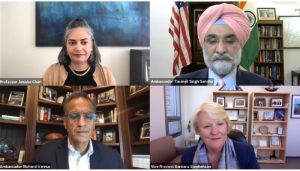UNC-Chapel Hill Hosts Panel Discussion on US-India Relations with Current, Former Ambassadors
April 26, 2021UNC Global Affairs

Top row, left to right: Anusha Chari, director of the Modern Indian Studies initiative; Ambassador Taranjit Singh Sandhu, India’s ambassador to the U.S. Bottom row, left to right: Ambassador Richard Verma, former U.S. ambassador to India; Barbara Stephenson, vice provost for global affairs at UNC-Chapel Hill and a former U.S. ambassador.
The Office of the Vice Provost for Global Affairs (OVPGA) at the University of North Carolina at Chapel Hill, in collaboration with Carolina’s Modern Indian Studies initiative, hosted the panel discussion “U.S.-India Relations Under the Biden Administration” on April 7, 2021. This event was part of a new series hosted by the OVPGA called Diplomatic Discussions, in which diplomats and international relations practitioners come to UNC-Chapel Hill to discuss important issues in diplomacy and international affairs.
The panel consisted of Ambassador Taranjit Singh Sandhu, India’s ambassador to the U.S., and Ambassador Richard Verma, former U.S. ambassador to India. Barbara Stephenson, vice provost for global affairs at UNC-Chapel Hill and a former U.S. ambassador, served as the moderator of the event.
Anusha Chari, director of the Modern Indian Studies initiative and professor of economics and finance at UNC-Chapel Hill, provided welcoming remarks at the panel. Chari spoke about how India became an economic powerhouse over the past few decades and how the two countries’ national interests have converged more recently.
Ambassadors Share Complementary Perspectives
Sandhu and Verma shared their outlooks on U.S.-India relations. Having already served as a diplomat in the U.S. twice previously, Sandhu remarked on what he called the incredible strategic convergence between the two countries. He described the economic, political and various other ties between the two nations.
“In President Biden, we see a strong friend of India in his actions and worldview as a senator, vice president, presidential candidate, and now as POTUS,” Sandhu said. “We have identified five main baskets, or areas for closer cooperation; health, digital, energy, education and, of course, the overarching strategy of defense.”
Verma discussed the evolution of the India-U.S. relationship, particularly how the countries have acted more as partners on the international stage.
“[During the Bush administration], the United States brought India into the nuclear fold, accepted India as a nuclear weapons power and significantly went to bat for India in the international system,” Verma said, and added this continued under the Obama administration, when the U.S. designated India as a major defense partner – something it has not done with any other country.
Verma said he thought the Biden administration was already showing its commitment to India early on with visits by Secretary of Defense Lloyd Austin and former secretary of state John Kerry, now the climate envoy under Biden.
Both diplomats spoke about the importance of the Quad, an alliance between the U.S., India, Japan and Australia, as the most powerful democracies in the Pacific region. Sandhu said each of these countries provides their own strengths in working on what he saw as three key initiatives: COVID-19 vaccine production, climate change and emerging technology.
“India brings the manufacturing capabilities, the United States brings in technology, Japan brings in finance, Australia brings in logistics, so the focus is very positive and concrete,” Sandhu said.
Economic Relationships
As the panel shifted its focus to economics, Verma said he sees India as moving from an emerging economy to an economic leader in the next 10 years, but more could be done to have a better developed economic relationship, such as an investment treaty or even establishing a trade agreement.
“But I also think we have to make a better case to the people of America and to the people of India as to why this economic relationship matters to Americans and Indians,” Verma said, emphasizing this was particularly important with rising nationalism in both countries.
Sandhu also explained that India has a principle of self-reliance, but this does not mean it is inward- looking.
“The [self-reliance principle] actually involves an India that draws upon the forward national strength in order to engage with the world as an important partner for global supply and value chains,” Sandhu said. “It is not isolationist or protectionist, but to the contrary, it’s an inclusive approach.”
Knowledge Partnerships
Finally, the panel discussed the importance of education exchanges between the two nations. Sandhu said that he sees India’s new education policy as pushing for more exchange between the two countries, with over 200,000 Indian students currently studying at universities in the United States.
Sandhu said the ability for Indian students to get an education in the U.S. and use that knowledge to go back and grow India’s economy is very important for the country’s future.
On educational opportunities at Carolina, Stephenson shared her excitement about launching the Diplomatic Discussions series and celebrating the capstone year of the Modern Indian Studies Initiative.
“Through programs like Diplomatic Discussions, as well as the participation of foreign policy practitioners in UNC courses and co-curricular programs, I can see UNC headed toward the very top tier of U.S. universities for the study of diplomacy, complementing our existing strengths in military and intelligence studies. I’m so grateful to launch Diplomatic Discussions with Ambassadors Sandhu and Verma,” said Stephenson.
This event was organized by the Office of the Vice Provost for Global Affairs and the Modern Indian Studies initiative at UNC-Chapel Hill. Campus partners included the following from the UNC-Chapel Hill College of Arts & Sciences: the Carolina Asia Center; Curriculum in Global Studies; Curriculum in Peace, War, and Defense; Department of Asian and Middle Eastern Studies; Department of Political Science; Department of Public Policy; and UNC Philosophy, Politics and Economics Program.
A recording of the event can be viewed online.
